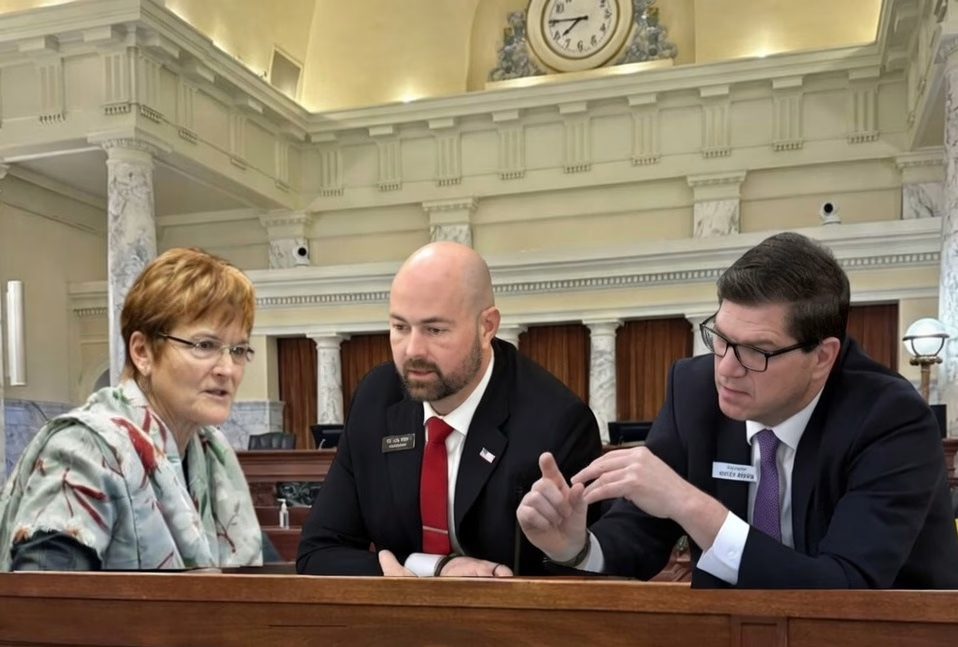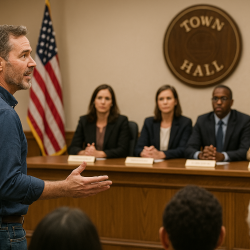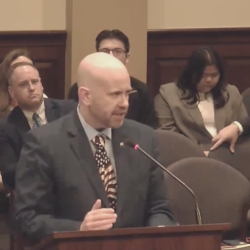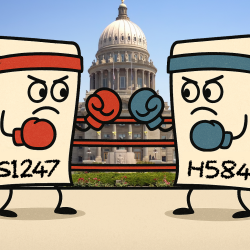Originally delivered Saturday, April 20, 2024, in Cascade, Idaho
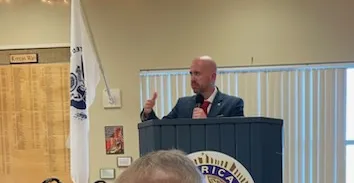
Thank you, thank you to Chair Faye Thompson for inviting me to speak here tonight. Thank you elected officials and candidates for being here. And thank you to all who have come out tonight, PCs and voters and citizens. Teddy Roosevelt said more than a century ago that it is not the critic who counts, but those who are actually in the arena. By showing up tonight, you are in the arena.
My name is Brian Almon. It’s a strange road that brought me here tonight. I’ve always been a political junkie, but for a long time I was only a spectator to politics. I’ve always enjoyed writing, but it was only a few years ago that I realized other people actually cared about what I wrote, and that it was a gift that could add value to the discourse.
With great power comes great responsibility, and having a platform means using it for good. Is the point to “own the libs” — or the moderates, for that matter? Or is it to push the needle in the direction of positive change? It’s easy to use words to justify doing nothing, or doing the wrong thing, rather than pressing forward with what you know is right.
Just a few days ago we closed the book on a very contentious legislative session full of passionate debate about important issues. In a few weeks we’ll go to the polls to make decisions about who represents the Republican Party, and those contests have also seen harsh rhetoric. Tonight, however, we celebrate what brings us together.
Unity need not mean compromising our values, but it does mean keeping open lines of communication and being willing to work together when we have shared goals. Yet a desire for unity cannot excuse you from boldly standing up for what is right, even if it feels like the whole world is against you. Right is right no matter what the majority believes.
Today we celebrate our unity as Republicans. Our party was formed 170 years ago when Americans gathered in buildings just like this one. Our country was in the midst of a crisis and nobody knew how the future would play out. In 1854, members of the Whig Party, the Free Soil Party, the Know Nothing Party, and several others gathered together to lay out a foundation for a new way forward. Our party was formed in the wake of the Kansas-Nebraska Act, a compromise that was meant to solve the problem of America being half free and half slave.
Like many compromises, however, it only exacerbated the problem. It kicked the can down the road for someone else to deal with later. A lot of politicians cheer the concept of “compromise” as if it is the end-all be-all of the political system. Perhaps not so much anymore, but I remember campaign ads boasting about how a candidate was able to “reach across the aisle” to “get things done”. There’s a conceit in politics that we will eventually reach an ideal position where all ideological concerns are done away with and our elected leaders simply do what’s best for everybody.
It’s good to see Controller Brandon Woolf here today. His office is one where the focus really is on pragmatic solutions — showing taxpayers how their money is being used, and that’s the only ideology at work. I appreciate the work he has done there. However, most elected offices deal with moral questions. The political spectrum in America today, and even in Idaho, represents people with vastly different worldviews. Can boys and girls change their genders with drugs and surgeries? Is abortion the taking of an innocent life or just a routine medical procedure? Is “systemic racism” a pernicious problem that needs government intervention to solve? Do we need “common sense” restrictions on owning firearms?
If you imagine our society on a simple left-right spectrum, just for the sake of this analogy, then any compromise means losing ground. The left wants to go here, the right wants to stay put, so we compromise in the middle. What have we accomplished? We’ve moved to the left, and that’s the story of America for the past hundred years.
Compromise is often necessary to accomplish anything, but it can also be a way around having to stand firm on what you know is right. The Missouri Compromise of 1820 said states north of the 36th parallel would be free, and those south would be slave. The Kansas-Nebraska Act undid that compromise and replaced it with “popular sovereignty” – members of each state would decide for themselves whether to be slave or free. That’s actually a more democratic system, right? Let the people decide. If your foundational principle is democracy, then that sounds great. You and I both know that pure democracy is a disaster. More often than not, mob rule is an impediment to freedom, because a system where 50% plus one can vote to take away your rights, take away your property, is not only unstable but a dire threat to liberty.
That’s why we’re Republicans, not Democrats.
The result of popular sovereignty was Bleeding Kansas, where both pro and anti slavery partisans migrated into the new territory hoping to form a majority at the time of statehood. These groups fought and murdered each other. This is what pure democracy looks like, right?
Principles are important.We all need a foundation for what we say and do. But cannot use principles as an excuse to avoid doing what is right. In the case of Kansas and Nebraska, Senator Stephen Douglas used the principle of popular sovereignty to avoid having to take a stand on the issue of slavery. The new Republican Party, on the other hand, placed the principle of human freedom higher than the will of the people.
Principles must not become suicide pacts. History remembers James Buchanan as one of our worst presidents because he did little to stop secession or prevent the Civil War, but from his point of view, he was standing on his principles. The Constitution did not give the president the authority to stop the southern states from seceding, and Buchanan was being careful to follow the letter of the law, even as his country was falling apart around him.
Down at the Capitol this year I heard a lot about the letter of the Constitution and the threats of lawsuits for anything that might go near violating it. It came from all sides. In just one example, when the Legislature passed a bill to prohibit public funds from paying for gender transitions, Democrats warned that this would end up in court, costing taxpayers a lot of money. Frankly, I was surprised to hear them feign such worry about taxpayer dollars, as on any other day spending our money is their favorite thing to do. But you see, they weren’t really concerned about the cost, but they know that you are, so they were appealing to your principles to accomplish their real goal of maintaining taxpayer support for gender transitions.
Do you see how that works? Every time you step out to do what is right you will be beset by critics who tell you why you can’t, why you shouldn’t, why your own principles and the letter of the law says no. The easy thing to do is to give in to those voices.
Recall former Arkansas Governor Asa Hutchinson vetoing a bill to ban child gender mutilation on the principle that Republicans don’t interfere with private medical decisions within families. He invoked the name of Ronald Reagan in justifying his preservation of that evil status quo.
That is moral cowardice, plain and simple. That is hiding behind your principles to avoid doing what is right.
James Buchanan is considered our worst president because he hid behind the words of the Constitution, while Abraham Lincoln is considered our greatest because he did what he believed was right, the Constitution be damned.
I have some southern friends who still can’t stand Lincoln. They’re good solid conservatives, but they still have the ancestral memory of a president who invaded their lands, suspended habeas corpus, threw journalists in jail, imposed martial law on the states that had not seceded, and waged war on their homelands.
They’re not really wrong, but it’s for those very reasons that history remembers Lincoln as a great man. He was faced with an unthinkable situation — the issue of slavery had come to a head and action was required one way or another. Lincoln said that a house divided could not stand, that the United States could not continue half slave and half free. He was determined that not only would the union continue, but it would be free, and so he did what he believed was right, and let history be the judge. He did not hide behind his principles to justify doing nothing.
Principles provide the framework for action, but they are not a substitute for action. I’m reminded of France on the eve of World War I. For decades, since their loss to Prussia in 1871, the French military doctrine had been to advance at all times, never to retreat. They drew this from evolutionary philosophy, the idea that all life had within it a vital force to survive, expand, and thrive. They called it elan vital.
This thinking provided the basis for the military schools which trained the officers and generals who would lead the nation into the Great War. They believed that an army of spirited warriors charging bravely into battle was not only gallant and heroic, but the best way to ensure victory.
As the great thinker Mike Tyson once said, everyone has a plan until they’re punched in the face. When the Great War broke out in 1914, hundreds of thousands — millions, even — of brave Frenchmen had to die before they learned the reality of 20th century warfare.
The words of the Constitution were self evident to the men who wrote them, but today we have critics and word wizards who twist them to fit their agendas. How much has “Shall not be infringed” been twisted today? What about “Congress shall make no law respecting an establishment of religion”?
Many conservatives today accept that prayer in schools and crosses on public land are unconstitutional. Would you be uncomfortable with a Republican president draping the White House in a Christian flag? The other side doesn’t have those scruples. The Biden Administration draped it in the trans rainbow flag just last year.
Seventy years ago, the skyscrapers of New York lit up their windows in the shape of crosses to mark Good Friday. Last month they lit themselves in the colors of the rainbow flag to celebrate so-called Transgender Day of Visibility. Does the law say that one is legal while the other is not? What about right and wrong?
Our written Constitution is a wonderful thing, but we can’t let it be a suicide pact. It’s our highest law, and the foundation of our political beliefs, which creates a target for cynical critics and word wizards. They find loopholes in the law, twist the words to support their agenda, and many conservatives feel forced to go along with it lest they feel like they’re betraying the Constitution.
We must decide who we are as individual actors, and as the Republican. Are we a party of James Buchanans and Asa Hutchinsons who hide behind words, or are we Abraham Lincolns who do what’s right and let history be the judge? Fortune favors the bold, and history rewards action, not excuses.
There was a saying back in the day that nobody ever got fired for buying IBM. So long as you’re following best practices, sticking to the letter of the policy manual, and doing what everyone else is, you need not worry about being held responsible for bad decisions. Politicians have adopted that mindset. Remember President Biden’s botched withdrawal from Afghanistan that left 13 US service members dead and billions of dollars worth of equipment in the hands of the Taliban? Nobody in leadership was fired or even chastised. “Mistakes were made,” as they say.
Rather than trying to find some objective overarching principle that we can apply to any situation, thereby relieving us of the responsibility of stepping out into the uncertainty of history’s judgment, we must embrace the idea that good things are good and bad things are bad. Child gender mutilation is bad, no matter how you twist the Constitution, conservative philosophy, or the words of Ronald Reagan avoid saying something that will make the talking heads on MSNBC or KTVB in Boise disapprove of you.
As conservatives, we believe in the rule of law, which extends to judicial precedent as well. Yet imagine if we had concluded that Roe v. Wade was the unassailable law of the land and simply gave up fighting to end abortion. Democrats urged us to do that, and some Republicans shrugged and accepted that premise. After all, how can we call ourselves constitutional conservatives if we disagree with a ruling made by the Supreme Court?
Of course we can disagree. Good things are good and bad things are bad. Democrats know this too, but their conception of the good and the beautiful is often 100% contrary to ours. The only reason they bring up concepts such as stare decisis, settled law, is because they know it’s something we care about. They will try to hold us to our own standards in pursuit of their awful goals. Don’t fall for it. Don’t let our enemies be the judge of whether or not you’re upholding your own principles.
Consider the wake of the 2020 election. Recall that the state of Texas sued Pennsylvania for unconstitutionally changing its voting process and thereby depriving Texas voters of a fair election, but the Supreme Court declined to rule on the merits of the case and simply dismissed it for lack of standing. A majority of justices — even those with conservative views — were unwilling to wade into such a controversial issue.
Moral cowardice. Rather than doing their jobs, the justices found a loophole. They used the letter of the law to shield themselves from having to make a hard choice. Had they heard the case they would have had to take a stand one way or another, but by dismissing it they could wash their hands of the issue, pass the buck to someone else.
Pontius Pilate washed his hands of a controversial issue that he wanted no part of. How has history judged him?
Two justices were willing to suffer the slings and arrows that would come from tackling a controversial issue. Samuel Alito and Clarence Thomas showed moral courage on that case, as they have their whole careers. In 2022, Justice Alito wrote for the majority that Roe v. Wade was overturned. He did this despite the wailing and gnashing of teeth he knew would come, and even protests and threats at the homes of the justices themselves.
It would have been easier to find some loophole in the law to say that abortion must remain legal nationwide, that Roe was settled law. Rather than making excuses, Alito did what was right, and we should never forget that.
We should not allow our elected representatives to use words as a shield for avoiding what is right. Voters must call it out when it happens and hold lawmakers accountable for moral cowardice. But we also must highlight those who go out on a limb to do what is right. We say “history” is the judge, but what is history? It’s not a being, or a god, it’s just us choosing how we remember those who came before us.
There will always be loopholes in every law, constitution, and set of principles. Human language is inadequate to the task of creating a perfect, watertight, bulletproof framework. The entire legal profession is built around finding the holes in the law, like hackers trying to take advantage of weaknesses in computer code. If you think about it, the first word hacker in history was the Serpent in Eden — “Hath God said?”
We cannot place our trust in words, even good words like those in our Constitution. As John Adams said, it was made for a moral and religious people, and would serve no other. Without a moral people willing to do what’s right, the Constitution is just words on paper, nothing more.
Our lawmakers are subject to a lot of pressure from all sides. Lobbyists from every industry and special interest group push them and pressure them and weave honeyed words to get them to do what they want. If you as a voter are not constantly talking to them as well then you can’t complain when they follow the loudest voices. They need you to keep them grounded in the real world, a world where ideas have consequences.
Elected officials need courage to do what is right, and they need our help to find that courage. They need to know that when the Democrats threaten lawsuits and nasty editorials if they go ahead with banning abortion or child gender mutilation that we will have their backs. We can help them say “bring it on!”
You and I, we’re not passive spectators of the history of our country. We’re not sitting in a theater watching all this play out on a movie screen. We are active participants, moral agents with the ability to make choices and judgments. Our lawmakers are not simply NPCs, non-player characters in a computer game who can only do what they’re programmed to do. They can make choices too. Principles and the letter of the law are a foundation for beliefs and actions but when it comes time to do what is right we all have the ability to transcend.
Politics is not a spectator sport. It’s up to you to get in the game, to step into the arena. As you’ve heard tonight, it’s time to step up, step out, and make your vote count. I want to close tonight with a few words of encouragement from a man who was never afraid to do what was right and let history be the judge.
On an April day not too different from this one in 1910, the great Republican Theodore Roosevelt spoke to a gathering of aristocrats at Sorbonne, one of the great universities of medieval Europe. At the age of 51, Roosevelt had already graduated from Harvard, wrote an acclaimed book of military history, served as police commissioner, old west sheriff, assistant secretary of the Navy, war hero, vice president, and of course, President of the United States. This was a man of action.
He spoke that day to the scions of French nobility about what sort of man was needed in a modern republic:
It is well if a large proportion of the leaders in any republic, in any democracy, are, as a matter of course, drawn from the classes represented in this audience to-day; but only provided that those classes possess the gifts of sympathy with plain people and of devotion to great ideals. You and those like you have received special advantages; you have all of you had the opportunity for mental training; many of you have had leisure; most of you have had a chance for enjoyment of life far greater than comes to the majority of your fellows. To you and your kind much has been given, and from you much should be expected.
Let the man of learning, the man of lettered leisure, beware of that queer and cheap temptation to pose to himself and to others as a cynic, as the man who has outgrown emotions and beliefs, the man to whom good and evil are as one. The poorest way to face life is to face it with a sneer. There are many men who feel a kind of twisted pride in cynicism; there are many who confine themselves to criticism of the way others do what they themselves dare not even attempt.
It is not the critic who counts; not the man who points out how the strong man stumbles, or where the doer of deeds could have done them better. The credit belongs to the man who is actually in the arena, whose face is marred by dust and sweat and blood; who strives valiantly; who errs, who comes short again and again, because there is no effort without error and shortcoming; but who does actually strive to do the deeds; who knows the great enthusiasms, the great devotions; who spends himself in a worthy cause; who at the best knows in the end the triumph of high achievement, and who at the worst, if he fails, at least fails while daring greatly, so that his place shall never be with those cold and timid souls who neither know victory nor defeat. Shame on the man of cultivated taste who permits refinement to develop into fastidiousness that unfits him for doing the rough work of a workaday world.
170 years ago, men gathered in granges and churches and community halls to create a new political party. They were determined to confront and defeat a grave evil, no matter the critics, no matter the legal loopholes or letter of the law. If the law was an impediment to doing what was right, they were determined to change it. They had moral courage. The Republican Party was founded upon moral courage.
Today, we face our own evils, and we also face our own critics, our own stumbling blocks in the form of words and principles that have been twisted against us. Like our forefathers we must show moral courage to do what we know is right. Let us leave here tonight with a renewed motivation to go out and do the work of saving our state, and our country, no matter what. Thank you!
About Brian Almon
Brian Almon is the Editor of the Gem State Chronicle. He also serves as Chairman of the District 14 Republican Party and is a trustee of the Eagle Public Library Board. He lives with his wife and five children in Eagle.


